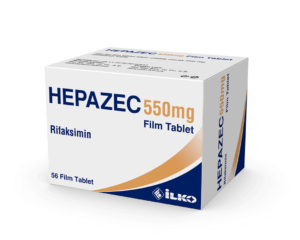Xifaxan/Lormyx/Hepazec (generic name rifaximin) is an antibiotic that is prescribed to treat a number of conditions that cause diarrhea. Most often, it is prescribed for cases of what is commonly known as “traveler’s diarrhea,” which is a disorder that shows up with loose stools and abdominal cramps. Other uses are for treating diarrhea that is caused by Irritable Bowel Syndrome with diarrhea (IBS-D) or Hepatic Encephalopathy.
What causes traveler’s diarrhea?
The most common cause of traveler’s diarrhea is the consumption of food or water contaminated with some common bacterial pathogens, such as Escherichia coli, Campylobacter jejuni, Shigella or Salmonella.
A number of viral pathogens, such as norovirus, rotavirus, and astrovirus can also trigger diarrhea. Less frequently, it can be caused by protozoa, such as Giardia intestinalis or E. histolytica
Depending on which part of the world, and the time of year, up to 70% of travelers can come down with diarrhea. In the past, it was recommended that some sanitary methods, like boiling drinking water, avoiding local food and so on, could prevent the problem, but studies have shown that this may not entirely protect you.
What are the main symptoms of traveler’s diarrhea?
After incubation, the symptoms range from mild cramps, fever and urgent loose bowel movements to abdominal pain accompanied by vomiting, and possibly bloody diarrhea.
Both bacterial and viral pathogens usually have an incubation period starting from 6 hours and up to 3 days. Protozoans usually have an incubation period of up to 2 weeks and don’t present with symptoms within the first few days of infection.
Without proper treatment of bacterial infections, the symptoms can last for 3–7 days. Viral diarrhea generally lasts one or two days less. Without treatment, protozoal infections can persist for months.
How does Xifaxan work for people with traveler’s diarrhea?
Xifaxan is specifically prescribed where the cause of traveler’s diarrhea is thought to be E. Coli. Xifaxan was found ineffective in patients with diarrhea caused by Campylobacter jejuni. In the case of travelers’ diarrhea caused by Shigella or Salmonella, its effectiveness has not been proven.
Xifaxan has been found not to be effective in patients with diarrhea complicated by fever or blood in the stool.
How does Xifaxan work for people with Hepatic Encephalopathy?
Adults who have some liver disease may be subject to hepatic encephalopathy, which is a build-up of toxins in the brain that can cause changes in thinking, behavior, and personality.
Hepatic encephalopathy may be triggered by the growth of certain bacteria that create toxins from digested food. Xifaxan acts to reduce the levels of bacteria, and so reduce the amount of toxins.
How does Xifaxan work for people with Irritable Bowel Syndrome?
Irritable bowel syndrome (IBS) is a chronic gastrointestinal disorder, the cause of which is not yet known. IBS-D is a particular form where irritable bowel syndrome is manifested with diarrhea.
Although the cause of IBS is not yet established, it has been suggested that it may be caused by food sensitivities or allergies or due to a genetic link.
The most common symptoms of the disorder include:
- Sudden urge for a bowel movement
- Abdominal pain or discomfort
- Gas
- Loose and frequent stools
- Inability to completely empty bowels
- Nausea
Xifaxan can improve symptoms of bloating and diarrhea by reducing or altering gut bacteria. It is typically prescribed as a 10 to 14 day course of treatment, but the dosage may be varied by the prescribing physician..
What are the side effects of Xifaxan?
The most common side effects of Xifaxan include:
- Swelling of the hands or feet
- Nausea
- Headache
- Dizziness
- Tiredness
Some of these side effects are also symptoms of traveler’s diarrhea which is being treated.
It can also cause some allergic reactions like rashes and itching.
A common side-effect of all antibiotics is to alter the usual levels of bacteria in the colon, and this can allow overgrowth of Clostridium difficile. This can cause pseudomembranous colitis, which is inflammation of the colon.
If you develop diarrhea, fever, abdominal pain, and shock after starting Xifaxan, which are signs of pseudomembranous colitis, you should contact your physician immediately.
What is the recommended dosage for Xifaxan?
For traveler’s diarrhea, the recommended dose is 200mg 3 times per day for three days. For hepatic encephalopathy, the recommended dose is 550mg twice daily. Your healthcare professional will have prescribed the dosage that is appropriate for your own condition.
Xifaxan may be taken with or without meals.
FAQ
How does Xifaxan work?
Xifaxan is a derivative of a naturally occurring chemical produced by the Streptomyces mediterranei bacterium.
In treating traveler’s diarrhea, it acts against Escherichia coli bacterial strains to prevent them from manufacturing proteins needed for their replication and survival. By restricting the volume of the bacteria, Xifaxan treats traveler’s diarrhea.
For the treatment of hepatic encephalopathy, Xifaxan works by reducing the intestinal bacteria that produce ammonia.
What precautions should I follow when taking Xifaxan?
If the prescribing doctor may not have been aware, tell your pharmacist if you are allergic to any other medications.
Tell your prescribing doctor if you have an allergy to cyclosporine or other antibiotics. Be sure to mention to your doctor if you have ever had liver disease. (https://7ziphelp.com/) Your doctor may decide to treat your diarrhea differently, or to change the dosage of Xifaxan and to monitor you for side effects.
Tell your pharmacist if you are taking any other nonprescription medications, vitamins, supplements, or herbal products.

Discuss this with your healthcare physician if you are pregnant, plan to become pregnant, or are breastfeeding. If you become pregnant while taking Xifaxan, call your doctor.
IsraelPharm sells Hepazec 550mg and Lormyx 200 mg. Click here for more details.















